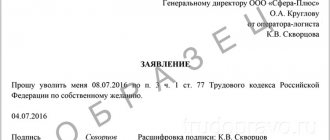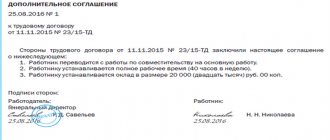Currently, employment in most companies requires a probationary period. During the probationary period, the company's management evaluates the professional and personal qualities of the employee, and at the end of it, makes a decision on the employee's further work in the company. If the employee fails the test, he may be summarily dismissed on the basis of notice. In this article we will talk about notification of failure to complete the probationary period and the mechanism for dismissing an employee.
The concept of probation
Modern practice shows that most employers prefer to hire for permanent jobs only those employees who have successfully completed the probationary period. The period during which management evaluates an employee’s performance is determined individually and depends on the specifics of the work of a particular department and the characteristics of the company’s activities as a whole.
The test period is necessarily recorded in the company’s internal regulatory documents. As a rule, it ranges from 1 to 3 months, during which the employee is considered officially employed in his current position.
The need for rework and how to avoid it?
In fact, dismissal during the probationary period has many advantages for the employee himself. In this case, there is no need to work for 2 weeks after writing the application, as provided for in Part 1 of Article 80 of the Labor Code of the Russian Federation.
According to the provisions of Article 71 of the Labor Code of the Russian Federation, you must notify your superiors in writing about your departure. This must be done within 3 days, that is, in total, the employee only needs to work a little in order to legally resign.
with your employer on different terms and leave much earlier. It is quite possible not to work additional days at all if you tell your employer about this decision in advance, since situations may be different.
Separately, you can ask permission from management to write a statement “retroactively.” In this case, working off may simply become a fiction.
It often happens that an employee worked in an organization for a very short period of time (2-3 days) or did not come to work at all. Consequently, the employment agreement is simply canceled and no entry is made in the work book .
Salaries are not paid, as are other monetary compensations. There is no need to work out anything, so it is better for the employee to adequately assess his prospects, the workforce and working conditions.
By the way, we have a great article on writing a resume if you're planning on looking for another job.
Upon dismissal in accordance with Art. 80 of the Labor Code of the Russian Federation there is a need to work out within 14 days. You can also reduce these periods by agreement with the employer. Moreover, an employee may have different situations that are specifically provided for in Art. 80 of the Labor Code of the Russian Federation (retirement, serious illness, enrollment in a university).
If the above legal facts are present, there is no need to work out the remaining days.
Dismissal of someone who fails the test: legislative framework
If there are no complaints against the employee during the probationary period, he continues his work in his position, maintaining his official salary, while it is possible to increase his salary on an individual basis. However, what should a manager do if, during the trial, an employee demonstrated business or personal qualities that are incompatible with his position?
Labor legislation comes to the aid of the employer. According to Part 1 of Art. 71 of the Labor Code of the Russian Federation, the employer is given the right to dismiss an employee according to a simplified procedure if the latter has not completed the probationary period. As part of the procedure, company management can dismiss an employee after giving him appropriate notice. The text of the document indicates the fact of failure to complete the probationary period (with a description of the reasons), as well as the upcoming dismissal.
The notice is given to the employee no later than 3 days before the planned dismissal.
The employee’s right to dismissal during the probationary period
Labor legislation guarantees not only the employer’s right to dismiss an employee during the probationary period. According to Part 4 of Art. 71 of the Labor Code of the Russian Federation, an employee who was not satisfied with the working conditions during the trial has the right to resign under a simplified scheme. The employee notifies the employer of the upcoming dismissal by submitting an appropriate application. After 3 days from the date of transfer of the document to the manager, the employee has the right to resign at his own request.
How to fire
Management has the right to dismiss an employee at any time during the trial, if this is provided for by labor legislation and does not violate the rights of the employee. Strict adherence to formalities is required.
How to fire an employee for failing to complete the probationary period? Let's consider a step-by-step algorithm for this process:
- Preparation of documentation that confirms the legal grounds for the decision made.
- Delivery of notice confirming dismissal due to failure to pass the test. This document must contain information that was the reason for dismissal: untimely completion of assigned tasks, non-compliance with work rules, disciplinary violations, poor quality work.
- Drawing up a dismissal order. Here the employee is required to sign as a sign of agreement with the reasons and fact of dismissal.
How to correctly write a notice of failure to complete the probationary period
Current regulations do not regulate the form according to which notification of failure to complete the probationary period must be issued. The document is drawn up in free form, but indicating the required details:
- full name of the organization;
- Full name and position of the manager on whose behalf the notification is submitted. This can be either the director of the company or a line manager responsible for working with personnel and personnel records (for example, the head of the HR department, the head of the HR department, etc.);
- Full name and position of the employee to whom the notification is sent;
- confirmation of the fact of failure to complete the probationary period;
- description of the reasons for failure to pass the test. In this paragraph, it is necessary to briefly and clearly indicate the criteria that were put forward to the employee and which he did not fulfill;
- a warning about the upcoming dismissal indicating a specific date (no earlier than 3 days from the date of drawing up the document), as well as references to labor legislation (LC Part 1, Article 71);
- date of the notification;
- signature of the originator (manager or person replacing him on the basis of a power of attorney).
At the end of the notification, a column “I have read and agreed” should be provided for the signature of the employee who did not pass the test.
Entry in the work book
The work book is filled out and returned to the citizen at the end of the last working day. A record is made according to the same rules as for dismissal for any other reason.
When employed for a probationary period, no notes about this condition are made in the work book. Therefore, if an employee passes the test and remains at work, then no additional entry is made about this.
The document is filled out on the basis of the prepared order (T-8 form). And the entry makes reference to Article TC 80 (employee initiative). Abbreviations in entries are not allowed.
Example entry:
“Dismissed in accordance with clause 3 of part 1 of article 77 of the Labor Code of the Russian Federation (employee initiative).”
We give notice to the employee
In order to dismiss an employee under a simplified scheme based on the results of the probationary period, the employer must draw up a notice and submit it to the employee, while complying with the norms of labor legislation. How to do this - see the instructions below.
Step 1. Compiling a notice
Draw up a notice in accordance with the sample provided, indicating the necessary details. When drawing up the document, special attention should be paid to justifying the reasons for dismissal. In the text, it is better to rely on specific facts (violation of labor discipline by an employee, untimely submission of reports, etc.) and regulatory documents (labor code norms, internal procedures of the company). The more clearly and convincingly the reasons are described as a result of which an employee is recognized as having failed the probationary period and must be dismissed, the lower the risk of disputes and claims from the employee.
Step 2. Sending the notification to the employee
To dismiss an employee in accordance with Article 71, the employee must receive notice no later than 3 working days before the expiration of the probationary period and the day of immediate dismissal. If the employee receives notifications later, then the norms of Part 1 Part. 71 of the Labor Code do not apply to him, and he cannot be dismissed under a simplified procedure.
Example 1. An employee was hired on 08/01/17, the probationary period is set until 11/01/17 (3 months). If an employee is recognized as having failed the probationary period, he may be dismissed on the day it ends – 10/31/17. Thus, the employer must send notice by October 25, 2017 (3 days before dismissal, excluding weekends).
The form of document transfer can be either standard (notification on paper) or electronic (message to a corporate email address), depending on the procedure adopted by the company.
Step 3. Obtaining the employee’s consent to dismissal
A prerequisite for dismissing an employee under Art. 71 – availability of his written consent. To optimize document flow, it is advisable to draw up a notice with the column “I have read and agree”, in which the employee can sign. Consent to dismissal based on the test results can be provided by the employee in the form of a separate document (application, receipt, etc.). However, this format is almost never used in current practice.
Step 4. Dismissal of an employee and settlement of payments
After the employee has been notified of the employee’s failure to complete the probationary period and his consent has been received, the employer can proceed directly to the dismissal procedure. In this case, the company should act in accordance with the general procedure, namely:
- HR department to prepare a dismissal order, with reference to Art. 71 Labor Code (date of dismissal – last day of the probationary period);
- accounting department calculate and pay wages and other remunerations no later than the day of dismissal;
- on the day of dismissal, the HR department fills out a work book (indicate the basis for dismissal - Part 1 of Article 71 of the Labor Code) and issue it to the employee.
It should be noted that the employee retains the right to challenge the results of the probationary period and dismissal in court.
How to dismiss an employee during the probationary period and after it at the initiative of the employer?
During the test, the employment agreement can be terminated either at the request of the employee or at the request of the employer.
If for any reason an employee no longer wants to work in this organization, he is obliged, even during the probationary period, to notify his superiors of the termination of the employment agreement.
Dismissal during a probationary period at the initiative of the employer can occur when he is dissatisfied with the employee’s work or unsatisfactory results of the post-training inspection. In this case, the employee must declare failure to pass the test and terminate the agreement.
But you can’t just fire an employee. You need to support your decision with strong evidence:
- poor performance of tasks;
- failure to fulfill assigned duties;
- inability to perform assigned work to the extent required;
- mismatch of qualifications;
- systematic violations, ignoring the rules and regulations established in the organization;
- violation of labor laws.
The reasons why the labor relationship breaks down when the probationary period is not passed should not be generalized, but rather specific.
The probationary period is necessary in order to look at the person being accepted in action. The duration of the trial cannot exceed 3 months, and when concluding a fixed-term employment contract for a period of up to six months, the probationary period does not exceed 2 weeks. When applying for a leadership position, the probationary period can last up to 6 months.
Dismissal based on the results of the probationary period can occur if the company's management is dissatisfied with the work of the new employee or unsatisfactory test results are obtained after training.
It is not possible to fire an employee just like that; there must be compelling reasons for this:
- poor quality work;
- failure to fulfill duties;
- inability to fulfill assigned tasks and volumes;
- mismatch of qualifications;
- constant violations of internal regulations;
- violation of labor and safety standards.
The reasons for dismissal should be exclusively specific and not general. Based on clause 2 of Art. 70 of the Labor Code of the Russian Federation, the condition of a probationary period must be reflected in the employment contract. If it does not include such a clause, then there is legally no test.
There are categories of citizens who cannot be given a probationary period:
- women – pregnant or having a child under 1.5 years old;
- persons elected through a competition to fill a position;
- minors;
- employees invited by transfer.
The full list of beneficiaries is given in paragraph 4 of Art. 70 Labor Code of the Russian Federation.
Important! If a hired woman turns out to be pregnant before the end of the test and has not completed her probationary period at work, she will not be fired (Article 261 of the Labor Code of the Russian Federation).
An employee leaving during a probationary period can do this at his own request. There should be no difficulties with how to quit during the probationary period. But to do this, it is necessary to notify the organization’s management in writing 3 days before the expected moment of termination of the employment contract. If both parties agree to terminate the employment relationship earlier, then work, including 3 days, is optional (Article 78 of the Labor Code of the Russian Federation).
In this case, the application is written in free form, indicating the reasons for dismissal. For example: “I ask you to dismiss me of my own free will before the expiration of the probationary period due to the fact that I am not satisfied with the working conditions in my position.”
However, it should be remembered that if the assigned probationary period has expired and management does not express a desire to terminate the contract, the employee automatically continues to perform his duties on a general basis. No additional documents are required. However, if the employee wishes to resign on his own initiative after the end of the probationary period, he will need to notify the employer at least 2 weeks in advance.
In some cases, when hiring, the possibility of passing a probationary period is not specified. In such cases, it is also necessary to work over a 2-week period.
Payments to an employee upon dismissal during a probationary period can only be made in the usual manner (salary, compensation for periods of unused vacation). But additional payments, for example, severance pay, can be counted on upon voluntary dismissal only if this condition is specified in local regulations.
We invite you to familiarize yourself with the Federal Migration Service check for foreign workers
Other information about the specifics of calculating severance pay can be read in the material “Is severance pay subject to insurance contributions?”
Hiring an employee with a mandatory probationary period is accompanied not only by a record of this condition in the employment contract. It is necessary to draw up a list of requirements and tasks, the fulfillment of which is mandatory for further enrollment in the staff. Successful completion of the probationary period includes, among other things, the solution of all tasks assigned to the employee.
If an agreement was initially concluded with the employee, which does not stipulate the existence of a probationary period or there is no separate written agreement on this condition, termination of the agreement as dismissal during the probationary period can be easily contested.
Dismissal of an employee during a probationary period, committed at the initiative of the employer, must be accompanied by a warning to the employee about the upcoming fact 3 days in advance (Article 71 of the Labor Code of the Russian Federation). To do this, the employee is given a written notice containing the reasons for dismissal and the date of termination of the contract.
Determining the timing of the test has its own characteristics. This period is set in calendar days, including weekends and holidays. However, the absence of an employee from the workplace due to other situations, including illness and unknown reasons, is not included in the probationary period.
If the end of the probationary period falls on a non-working day, then the last day of performance of official duties in this status is considered to be the previous working day. That is, if the employer nevertheless decides to dismiss the employee during the probationary period, then the notice will need to be given in advance.
As soon as the probationary period comes to an end, the employee is considered accepted for the position, unless otherwise specified in the employment contract. The simplified dismissal procedure available to employers during a probationary period is no longer valid, and the employee is subject to the rules in force for ordinary employment.
The employer has the right to terminate the contract with an employee who has failed to cope with his duties during the probationary period and has also shown himself to be unable to perform further work.
Dismissal during the probationary period can be carried out before the end of this period. The employer can terminate the contract with a new candidate at the very beginning of his work. However, the fact of non-compliance with the position held by the employee will have to be confirmed.
Before dismissing an employee who has not passed the probationary period, he should be given a notice of dismissal, and this must be done 3 days before the order is issued. This period, as well as the basis for terminating an employment contract with an employee who has not passed the test, is valid only during the probationary period.
The following periods do not apply to the probationary period:
- vacation (including at your own expense, educational);
- periods of incapacity;
- periods of downtime in production if the employee is absent at this time with the knowledge of management;
- suspension from work;
- performance of state or public duties;
- absence from work for unknown reasons.
You can read more about registering absenteeism from work in the article “How to properly register absenteeism for an employee under the Labor Code of the Russian Federation?”
Employee business trips are included in the probationary period. Moreover, based on the results of completing travel assignments, one can judge the employee’s suitability for the position held.
During the entire period of the employee’s probationary period, the employer will need to record the facts of completion or non-fulfillment of tasks, confirming everything with documents. If conflict situations arise, the employer, during dismissal during the probationary period, can, with the help of such documents, provide irrefutable arguments in favor of the employee’s incompetence.
Evidence of unsuccessful completion of the probationary period may include information from the following sources:
- reports of unsatisfactory product quality;
- memos and reports from immediate superiors and other employees about the unsatisfactory quality of work of the tested employee;
- minutes of the meeting of the commission to discuss the results of the probationary period;
- employee reports on the results of his activities.
If during the probationary period disciplinary measures were taken against the employee, then these facts can also serve as evidence of his inadequacy for the position held.
In addition, the tested employee must be familiarized with the internal regulations, job descriptions and other local regulations against receipt.
We invite you to familiarize yourself with what are the deadlines for accepting an inheritance by law
More detailed information about the responsibilities of HR employees at an enterprise can be found in the material “HR records management from scratch - step-by-step instructions.”
If the employer has an unsatisfactory impression of the employee who has completed the probationary period, the employer has the right to dismiss him as someone who has not completed the probationary period in a simplified manner (Part 1 of Article 71 of the Labor Code of the Russian Federation). However, this will require following a certain procedure, the main component of which is notification of termination of the agreement.
When designing, you should consider the following subtleties:
- notice of dismissal must be given no later than 3 calendar days before the planned day of termination of the employment agreement;
- if the notice is not given to the employee before the end of the probationary period, he is considered to have successfully passed the probationary period, and dismissal in a simplified manner becomes impossible;
- The notice must indicate the reason for the non-compliance with the position;
- It is prohibited to make a decision on dismissal if the employee is on sick leave or on vacation at that time.











